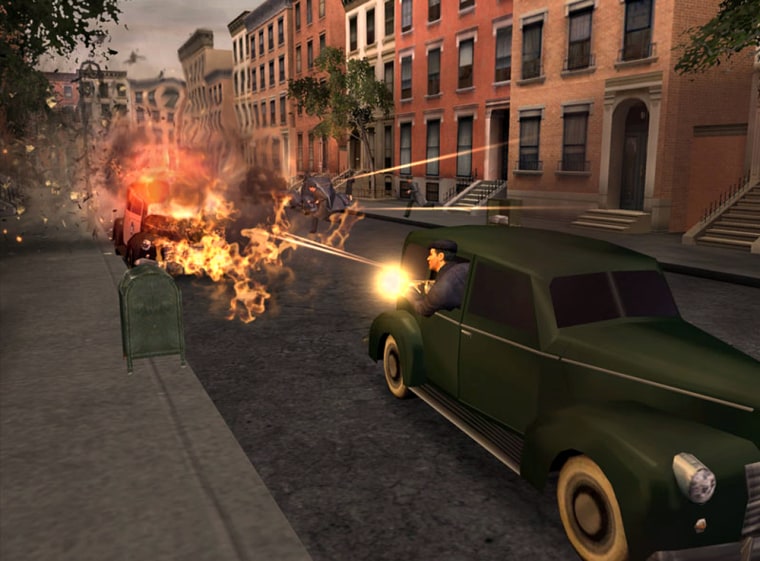Videogame kingpin Electronic Arts launches "The Godfather: The Game" today, hoping that fans who love the popular gangster movie franchise will love the game too.
On paper, the company could have a hit on its hands: Though Godfather director Francis Ford Coppola and star Al Pacino have distanced themselves from the project, secondary actors James Caan and Robert Duvall have lent their voices to the game. The late Marlon Brando, who played the iconic title character in the movies, also has a few lines in the game. And the game's free-flowing, shoot 'em up style and plot ape those of the super-successful Grand Theft Auto videogame franchise.
But even if gamers flock to EA's newest title — and early reviews for the game have been underwhelming — games like "The Godfather" may not be enough to help the company out of its rut.
The company earned $259 million on sales of $1.27 billion in its most recent quarter, down 31 percent and 11 percent, respectively, from the prior year; the company has been struggling to meet financial forecasts since March 2005. Competitors Activision and THQ haven't fared much better, but as the industry leader with about one-quarter of the videogame software market, EA has the most at stake.
Analysts invariably attribute the industry downturn to a combination of the console-transition doldrums — Microsoft only introduced its new Xbox 360 last fall, while Sony and Nintendo have yet to roll their new machines out — and a contagious case of franchise "sequelitis."
Both of those factors will afflict EA as it attempts to coax gamers into making one last purchase for their now-antique systems. To get them in the mood, the company has been on a marketing blitz, buying its own ads and working in conjunction with Viacom, whose Paramount studio owns the original movie titles, to produce faux-documentaries on the games that were aired on Viacom-owned cable channels like MTV and Spike.
Analyst say the ad campaign could tack another $5 million onto production costs that likely ranged between $20 million and $30 million. Combine that outlay with a marked-down retail price of $39 — most new high-end games start out around $49 — and EA will have a hard time turning Don Corleone and company into moneymakers.
Had EA managed to get the game on shelves last fall when it had initially planned, it could have expected to rack up 30 percent more sales from Christmas season shoppers. It might also have benefited from last fall's launch of the Xbox 360, which has so far suffered from a lack of compelling titles.
Deutsche Bank analyst Jeetil Patel projects that EA will sell between 2.5 million and 4 million copies of the game. In order to justify a sequel, the company will need to sell at least 3 million, Patel says. In contrast, a major hit like Take Two Interactive's "Grand Theft Auto: San Andreas" sold 9 million copies after its October 2004 launch.
If EA wants to come up with its own blockbusters, it may need to shift gears. Movie tie-ins and sports sequels haven't performed for the company like they used to. President V. Paul Lee recently acknowledged this and said he wanted original content to make up half of the new titles the company releases.
But while the entire industry says it wants to develop more original content, that era hasn't arrived. "The seeds of change are taking root, and we'll see the results in a few years," says NPD analyst Anita Frazier. "It isn't here yet."
New titles from Nintendo demonstrate the type of interactive and nontraditional games the other companies are striving for, says Frazier. "When the rest of the industry sees the success Nintendo has from that, they'll jump right on the bandwagon."
Meanwhile EA, like the rest of the industry, is looking to make up for declining revenue with "casual games" — low-intensity, low-cost games that give people in nontraditional gaming demographics — like mothers, retirees and office workers — a chance to get a quick gaming fix.
In 2001, it bought casual-gaming site Pogo.com for $42 million and now has hundreds of thousands of members who play card, word and pattern games against each other at all hours of the day.
And in December 2005, EA entered another gaming market when it bought Jamdat, a maker of mobile games including the popular Tetris-like "Bejeweled."
So what's next for EA? In late 2006, the company plans to launch a quirky PC game called "Spore," where gamers control the evolutionary process of a species, taking part in its development from primordial ooze to space flight. It represents a swift departure from the predictable sports and movie titles the company has been priming its pump with in recent years.
But after that, it's back to another long-awaited franchise series — this time, "The Simpsons" — a perfect example of the highly developed ties EA has with the entertainment industry. It's a hard habit to break.
